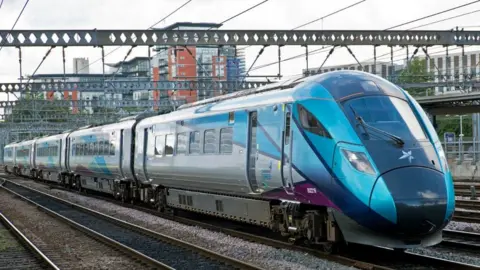Rail disruption: Train cancellations as high as 13% in 2023
 Transpennine Express
Transpennine ExpressBritain's busiest railway stations with the highest rates of cancelled trains this year have been revealed.
As of 31 July, Huddersfield has had more than 5,500 scheduled trains cancelled - the highest rate at 13%.
BBC analysis of National Rail data also shows that almost half of the trains that ran across Britain were at least one minute late.
The government said operators needed to deliver punctual services and improve delays and cancellations.
The analysis of National Rail data, collated by On Time Trains, shows that, of the 100 busiest railway stations, Manchester Victoria had the second highest cancellation rate at 10%.
York, Newcastle and Manchester Oxford Road all followed at 9%.
 Caroline Devonport
Caroline DevonportCaroline Devonport, from South Kirkby, has been catching the train to Huddersfield for five years.
"The last six months have been absolutely horrendous," the 48-year-old said. "Because of the risk of delay, I now leave an hour early for work. I'm absolutely shattered all the time from being on trains.
"I've seen quite a lot of aggression towards guards from other passengers because people are late and delayed and frustrated.
"The strikes have an impact, but the train companies themselves are really badly managed, and their customer services are often very rude."
TransPennine Express (TPE), which manages Huddersfield, was brought under government control in May after months of complaints about delays and cancellations.
Prior to being taken over, it had the highest cancellation rate of all train operators, according to data from the Office of Rail and Road.
Chris Jackson, interim TPE managing director, said, since coming under government control, "we have seen improvements in performance and have made real progress in rebuilding union relationships on a local level".
He said that the resumption of drivers working on rest days had helped bring cancellations at Huddersfield down "to 3.5%, with an overall figure of 5.5% for the entire TPE network".
"We know there is more to do, and we are actively developing plans to deliver the reliable, punctual and resilient railway our customers expect and deserve," Mr Jackson added.
'Sort this out'
The analysis of data for 2,555 stations also suggests that, between 1 January and 31 July:
- In total, 3% of trains in Great Britain were cancelled, 56% were on time, while 41% were at least one minute late
- Overall, stations in Wales had the highest cancellation rate, at 7%
- Of the English regions, the North East had the highest cancellation rate, at 6%
- But Yorkshire and the Humber had the lowest percent of trains on time, at 42%
Paul Tuohy, chief executive officer of the charity Campaign for Better Transport, said: "We want people to travel by train so high rates of cancellations are unacceptable.
"The government and industry need to sort this out and ensure services run to schedule so that passengers can travel with confidence."
Christine Wise, 57, from Stalybridge, said she cannot rely on the local train to get to her new job in Manchester.
"At least one a morning is cancelled," she said, adding that she now drives to Ashton-under-Lyne to catch a tram.
"It takes much longer, about 40 minutes. It's irritating because it's lost time. I get up quite early in the morning to get to work, to get in early, to get my work done. I don't like the lost time element of things.
"Over my lifetime, trains have never really run to time, but there weren't as many delays and cancellations as there are now. It's markedly worse."

TransPennine Express was nationalised following customer complaints of poor service and cancelled trains. How did passengers cope?
Watch now on BBC iPlayer (UK only)

'Quietly scrapped'
Network Rail said: "We know performance has not been good enough for passengers and we're working closely with train operating companies to improve.
"Moving forward, the creation of Great British Railways (GBR) will allow us to take a holistic view of performance, simplifying our rail network and providing better, more reliable services for our passengers and freight customers."
In March, Derby was chosen to host GBR's headquarters, a planned public body which will run trains across the country and set most fares and timetables.
Four months later, Rail Minister Huw Merriman reassured the city that the government remains "really committed" to GBR, denying reports it had been "quietly scrapped."
The railways have seen strike action each month this year.
On 1 September, members of the Associated Society of Locomotive Engineers and Firemen (ASLEF) went on strike, impacting 16 operators.
The following day, 20,000 RMT members also took action.
Mike Whelan, general secretary of ASLEF, said the rail industry had declined under the Conservative government.
"That's the price we are all paying - passengers, staff, and businesses in Britain - for privatisation which everyone in the railway industry - except the ideologues in the government - knows hasn't worked," he said.
"We should be encouraging more people to use our trains - taking cars off the roads and reducing carbon emissions - rather than trying to deter passengers from travelling."
A Department for Transport spokesperson said: "Ministers have been clear with operators they need to deliver punctual services, keeping delays to a minimum.
"To help make our railways more reliable, it's crucial unions agree to reforms that will modernise the industry."
